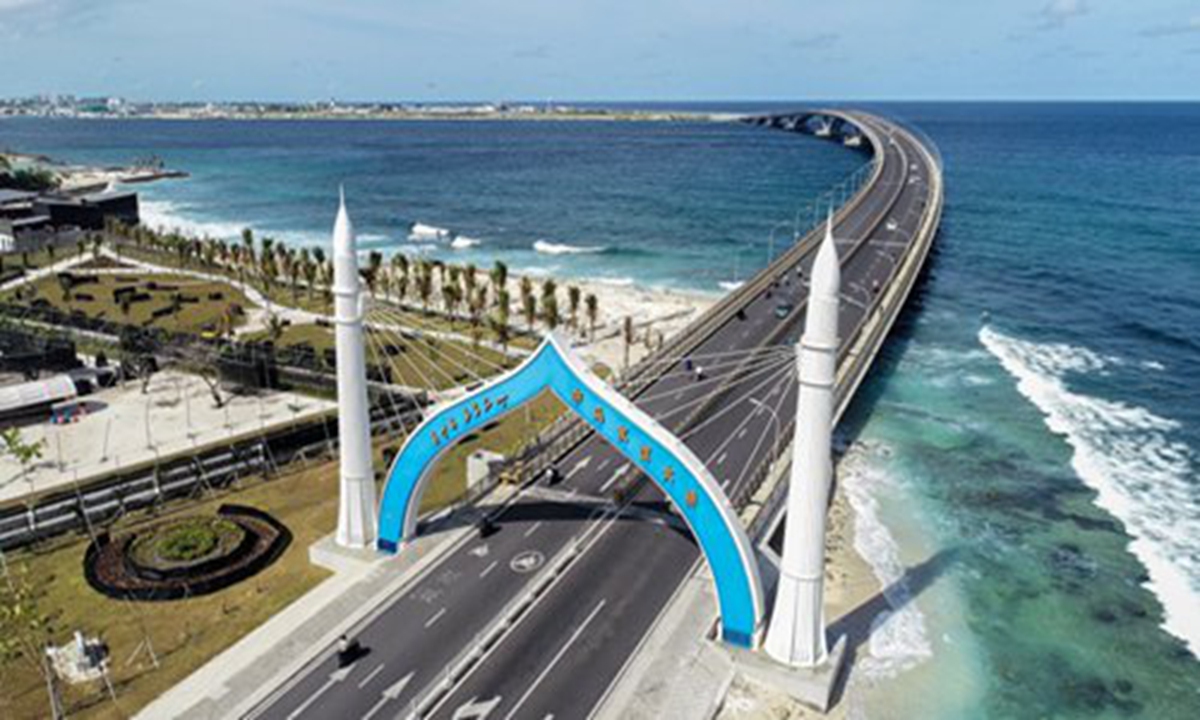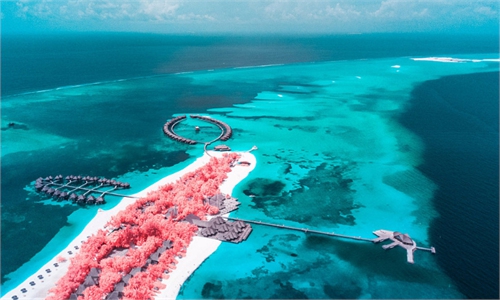
An aeriel view of the China-Maldives Friendship Bridge linking the Maldivian capital of Male with neighboring island Hulhule Photo: Xinhua
At the invitation of Chinese President Xi Jinping, President of the Republic of Maldives Mohamed Muizzu will begin his five-day state visit to China on Monday.China and the Maldives have a long history of cooperation. Economic and trade ties between the two countries began in 1981. In December 2014, top officials from the two countries met in Beijing for the first meeting of the China-Maldives Joint Committee on Trade and Economic Cooperation. In 2017, the two countries signed a Free Trade Agreement, under which they sought to reduce the tariffs of over 95 percent of the goods in bilateral trade to zero. At the same time, both sides have also made commitments to further open their service departments.
Over the years, there have been many fruitful results in successful bilateral cooperation. Since 2010, China has been the Maldives' largest source of tourists for 10 consecutive years. In 2022, bilateral trade amounted to $451 million, up 10.1 percent year-on-year. The China-Maldives Friendship Bridge, a landmark project of the China-proposed Belt and Road Initiative (BRI) and a symbol of the profound friendship between the two countries, has witnessed over 100 million crossings by local people over the past five years since its opening in 2018.
Through this political experience, Muizzu witnessed how much the Maldives could gain from engaging with China. During his office as mayor of Malé, Muizzu, who had a clear understanding of the positive impact of the BRI on the Maldivian economy and society, actively promoted the Maldives' participation in the BRI. During his visit to China, the two countries are expected to continue to strengthen cooperation under the BRI on a large scope. Observes widely believe that a series of cooperation documents are expected to be signed between the two sides, covering economic and cultural exchanges, joint efforts to address climate change and green cooperation, among other areas.
Muizzu's visit to China has received extensive attention from the Indian media, which, days before the official announcement of the trip, speculated that the president might visit China before traveling to India as if visiting one country first reflects this nation is more important. This shows that India views South Asia as its own sphere of influence, demanding that countries in the region, including the Maldives, prioritize India in their diplomatic relations. In particular, New Delhi hopes that the Maldives could adopt its confrontational approach toward Beijing. Muizzu's decision to visit China before India does not necessarily mean that he is "pro-China and anti-India." It only demonstrates that Muizzu is treating India with a normal mind-set and steering the relationship between the Maldives and India to a normal state-state relationship.
Under normal circumstances, when a new leader comes to power, they arrange their visits based on the importance and urgency of the matters to be dealt with. President Muizzu broke tradition by visiting Turkey for his first official overseas visit instead of India.. He then visited the United Arab Emirates in early December to attend the COP28 meeting, reflecting his recognition that combating global warming is a matter of life and death for his nation. This is also in line with his statement to the Indian media that "my government will pursue a 'pro-Maldives' policy."
The Maldives is well aware of the need to find a new way forward, and only by strengthening itself will it be able to reject regional hegemony. From the Maldives' perspective, it values its cooperative relationship with China more, especially in the field of economic development. A stable and prosperous economy is crucial to the Maldives, and China's cooperation and assistance can help the country achieve this goal.
China has always treated the Maldives as an equal partner and respected its sovereignty. It also respects the friendly and cooperative relationship between the Maldives and India, fully aware of the importance for Malé to maintain good relations with New Delhi. Beijing has never asked Malé to reject New Delhi because of the conflicts between China and India, nor does it view cooperation between the Maldives and India as unfriendly or a threat. It is also willing to carry out trilateral cooperation between China, India and the Maldives. New Delhi should stay more open-minded, as China's cooperation with South Asian countries is not a "zero-sum game."
The author is a professor of the School of International Relations, Sichuan International Studies University and president of Chengdu Institute of World Affairs. opinion@globaltimes.com.cn


